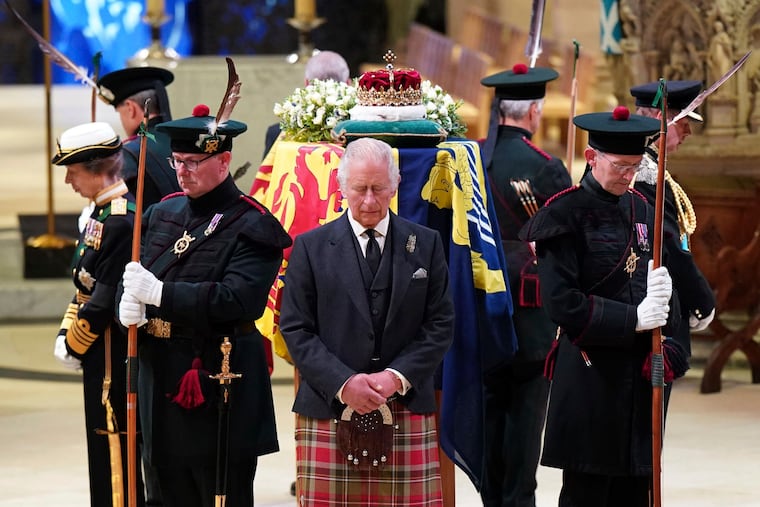Letters to the Editor | Sept. 13, 2022
Inquirer readers remember Queen Elizabeth II and ponder City Council vacancies.

Remembering Queen Elizabeth II
When I lived in Edinburgh, a friend of mine, whose father was in the queen’s honorary Scottish guard (or something like that), was invited to the queen’s annual garden party at her palace of Holyroodhouse. When my friend returned, her feet were aching, although she was only in her 20s and not wearing high heels. I learned that when the queen is standing at an event, no one in attendance is supposed to sit. And, of course, the queen spent the entire tea party standing, greeting guests, giving everyone the opportunity to have their moment with their queen, so everyone else had to remain standing. The queen was in her 60s at the time, and I thought of how tired she must have been.
I thought back on that day many times, as I saw photos or footage of the queen at similar events in her 70s, 80s, and into her 90s, and admired her stamina and dedication to duty. I once saw a response she gave to a question about the bright-colored outfits and hats she wore, especially in her later decades. Her response was that she knew her subjects wanted to be able to spot their queen, and especially as she became shorter in old age, she wanted to make it easier for them to spot her in a crowded event — that, too, was a way she was mindful of serving her people.
David W. Feldman, Merion Station
Amidst so much geopolitical uncertainty and economic volatility, the queen was naturally a reassuring figure on the world stage. Through her unparalleled experience of history and encounters with so many world leaders, she developed into a respected stateswoman. She did not often speak in public, but her speech to the U.N. in 2010 was notable for its acknowledgment that enduring change often occurred from the bottom-up as much as from the top-down. Addressing the assembly in New York, she said: “I have also witnessed great change, much of it for the better, particularly in science and technology, and in social attitudes. Remarkably, many of these sweeping advances have come about not because of governments, committee resolutions, or central directives — although all these have played a part — but instead because millions of people around the world have wanted them.”
Over recent years, the “strongman” leader has asserted his presence in many countries, most disturbingly in the form of Vladimir Putin in Russia. Yet the queen’s achievements in international relations show the crucial and enduring effectiveness of soft power. Over 70 years, she built positive sentiment, understanding, and respect between nations. Her passing is mourned throughout the world and is a chance to pay tribute both to a monarch and to an extraordinary, exemplary diplomat.
John Studzinski, CBE, London
Remote governing, remote thinking
It was appalling to read that Philadelphia City Council has not met in person for more than two years, making it the only major city legislative body in the nation failing to return to work.
Council President Darrell L. Clarke continues to cite safety concerns; does he realize that all other city employees are working, as is the general public? Is there any doubt that these aspiring mayors and their wannabe replacements will be out pressing the flesh as they campaign?
Speaking of which: As councilmembers with mayoral aspirations scramble to resign, they have created a debacle for the upcoming midterm elections. By dragging their collective feet in announcing their intentions, undoubtedly to collect city paychecks while strategizing on summer “recess,” election officials will now need to do some serious scrambling to get would-be replacements on November’s ballot.
This process cannot even start until candidates are named and any remaining unannounced players (Helen Gym? David Oh?) resolve to fish or cut bait.Decades ago, former Mayor William Green once described City Council as “the worst legislative body in the free world.”What’s changed?
J. Savage, Philadelphia
Plan now for wintertime highway safety
It will happen again; it happens every winter, and the danger is still there. Every year we see photos of miles of stranded motorists in blinding snow. Every year.
Thousands of people, miles of cars and trucks, trapped in freezing snow with no chance to escape to the safety of driving away in the empty lanes, just the other side of the endless Jersey Barriers.Escape passages must be built to allow motorists to get away by simply crossing through to the other side of the endless Jersey Barriers.
State departments of transportation must build escapes through the concrete to save us from being trapped there again and again in these deadly winter conditions. It’s a matter of life and death.
Gardner A. Cadwalader, Philadelphia, gacadwalader@gmail.com